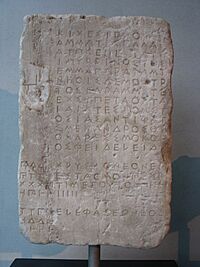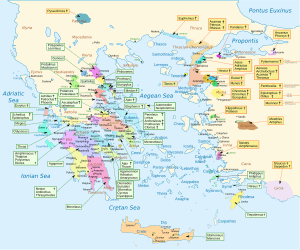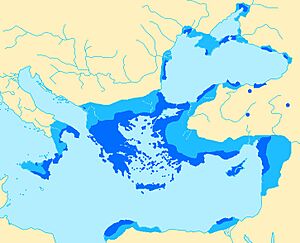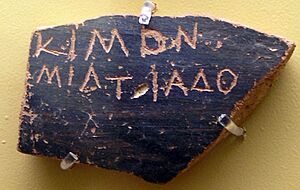Ancient Greek facts for kids
Quick facts for kids Ancient Greek |
||||
|---|---|---|---|---|
| Ἑλληνική Hellēnikḗ |
||||

An inscription about the construction of the statue of Athena Parthenos in the Parthenon, 440/439 BC
|
||||
| Region | Eastern Mediterranean, Greco-Roman world | |||
| Language family |
Indo-European
|
|||
| Early forms: |
Proto-Greek
|
|||
| Writing system | Greek alphabet | |||

|
||||
|
||||

Ancient Greek (Ἑλληνική, Hellēnikḗ) was the language spoken in ancient Greece and other parts of the ancient world. It was used from about 1500 BC to 300 BC. This long period is often divided into different stages. These include Mycenaean Greek (around 1400–1200 BC), the Greek Dark Ages (about 1200–800 BC), the Archaic or Homeric period (around 800–500 BC), and the Classical period (about 500–300 BC).
This amazing language was used by famous writers like Homer. It was also the language of historians, playwrights, and philosophers in Athens. Many words in English come from Ancient Greek. It has been an important subject in schools in the Western world since the Renaissance. This article will focus on the Epic and Classical periods. These are the best-known and most typical forms of Ancient Greek.
After 300 BC, Ancient Greek changed into Koine Greek. Koine Greek was a common language used across a wider area. Even though it was a new stage, its early form was quite similar to Attic Greek. Over time, Koine Greek slowly became more like Medieval Greek and then Modern Greek.
Ancient Greek had several different ways of speaking, called dialects. Some of these were Attic, Ionic, Doric, Aeolic, and Arcadocypriot. Attic Greek became the main basis for Koine Greek. While Koine is often grouped with Ancient Greek, Mycenaean Greek is usually studied separately. This is because the Greek spoken in the first millennium BC is what most people think of as "Ancient Greek."
Contents
Different Ways of Speaking Ancient Greek
Ancient Greek was not just one language. It was a group of dialects, meaning there were many different regional versions. The main dialect groups were Attic and Ionic, Aeolic, Arcadocypriot, and Doric. Each of these had even smaller differences within them. Some dialects were used in famous books and poems. Others are only known from old inscriptions carved into stone.
Homeric Greek is a special literary form of Archaic Greek. It was used in the famous epic poems, the Iliad and the Odyssey, written by Homer. This dialect had some differences in grammar and pronunciation from the Classical Attic dialect.
How the Dialects Developed
Experts believe that the main Ancient Greek dialect groups began to form around 1120 BC. This was around the time of the Dorian invasions. These invasions likely caused people to move around. This led to different groups of Greeks speaking slightly different versions of the language. The first clear written examples of these dialects appeared in the 8th century BC.
The ancient Greeks themselves thought there were three main groups of Greek people: Dorians, Aeolians, and Ionians. Each group had its own distinct dialect. Modern studies of language and archaeology largely agree with this idea.
Some of the main dialect groups included:
- West Group (like Northwest Greek and Doric)
- Aeolic Group (found in places like Thessaly and Boeotia)
- Ionic-Attic Group (including Attic and Ionic)
- Arcadocypriot Greek (Arcadian and Cypriot)
The difference between West and non-West Greek was the oldest and most important division. Arcadocypriot Greek seems to have come more directly from Mycenaean Greek.
After Alexander the Great's conquests in the late 4th century BC, a new common language developed. This was called Koine or Common Greek. It was mostly based on Attic Greek but had influences from other dialects. Koine Greek slowly replaced most of the older dialects. However, the Doric dialect has survived in the Tsakonian language, which is still spoken today near modern Sparta. By about the 6th century AD, Koine Greek had gradually changed into Medieval Greek.
Related Languages
The Phrygian language was an ancient language spoken in parts of Anatolia. Some linguists believe it was closely related to Greek. Among other ancient languages that still have descendants today, Greek is often thought to be most closely related to Armenian and Indo-Iranian languages.
How Ancient Greek Words Change

Ancient Greek, like many old languages, had a complex grammar. Words changed their endings a lot. This is called being "highly inflected."
Nouns (words for people, places, things) in Ancient Greek had five different forms, called cases. These cases showed the word's role in a sentence (like who is doing the action or who something belongs to). Nouns also had three genders (masculine, feminine, and neuter) and three numbers (singular for one, dual for two, and plural for more than two).
Verbs (action words) also changed their forms in many ways. They had four moods (like indicative for facts, imperative for commands), three voices (active, middle, and passive), and three persons (first, second, third). Verbs also had different tenses and aspects to show when an action happened and how it was completed.
How Ancient Greeks Wrote
The very first examples of Ancient Greek writing, from around 1450 BC, used a system called Linear B. This was a syllabic script, meaning each symbol stood for a syllable.
However, starting in the 8th century BC, the Greek alphabet became the standard way to write. This alphabet was used across different Greek regions, though with some small variations. Early texts were often written in a style called boustrophedon. This meant writing went from right to left on one line, then left to right on the next, like an ox plowing a field. Later, writing from left to right became the usual way.
When you see modern editions of ancient Greek texts today, they usually have special marks. These include accents and breathing marks, spaces between words, and modern punctuation. Sometimes they even use capital and small letters. But these features were all added much later to make the texts easier to read. The original ancient writings did not have them.
Examples of Ancient Greek Writing
Here is the beginning of Homer's famous Iliad. This shows the Archaic period of Ancient Greek:
Μῆνιν ἄειδε, θεά, Πηληϊάδεω Ἀχιλῆος
οὐλομένην, ἣ μυρί' Ἀχαιοῖς ἄλγε' ἔθηκε,
πολλὰς δ' ἰφθίμους ψυχὰς Ἄϊδι προΐαψεν
ἡρώων, αὐτοὺς δὲ ἑλώρια τεῦχε κύνεσσιν
οἰωνοῖσί τε πᾶσι· Διὸς δ' ἐτελείετο βουλή·
ἐξ οὗ δὴ τὰ πρῶτα διαστήτην ἐρίσαντε
Ἀτρεΐδης τε ἄναξ ἀνδρῶν καὶ δῖος Ἀχιλλεύς.
The beginning of Apology by Plato is a great example of Attic Greek from the Classical period:
Ὅτι
μὲν
ὑμεῖς,
ὦ
ἄνδρες
Ἀθηναῖοι,
πεπόνθατε
ὑπὸ
τῶν
ἐμῶν
κατηγόρων,
οὐκ
οἶδα·
ἐγὼ
δ' οὖν
καὶ
αὐτὸς
ὑπ'
αὐτῶν
ὀλίγου
ἐμαυτοῦ
ἐπελαθόμην,
οὕτω
πιθανῶς
ἔλεγον.
Καίτοι
ἀληθές
γε
ὡς
ἔπος
εἰπεῖν
οὐδὲν
εἰρήκασιν.
How you, men of Athens, are feeling under the power of my accusers, I do not know: actually, even I myself almost forgot who I was because of them, they spoke so persuasively. And yet, loosely speaking, nothing they have said is true.
Ancient Greek Today
Learning Ancient Greek in Schools
Studying Ancient Greek, along with Latin, was very important in European schools from the Renaissance until the early 20th century. This was also true in the United States, where many of the country's founders had a classical education.
Today, Ancient Greek is still taught in many traditional or elite schools across Europe. For example, it is a required subject in the liceo classico in Italy. It is also compulsory in the gymnasium in the Netherlands and in some classes in Austria and Croatia. In Germany, it is an optional third language in humanities-focused schools. In 2006/07, about 15,000 students in Germany and 280,000 in Italy were studying Ancient Greek.
It is a required subject in the humanities branch of the Spanish Baccalaureate. Most major universities worldwide teach Ancient Greek, often with Latin as part of classics studies. In 2010, some primary schools in the UK began teaching it to help children's language skills. It was also one of seven foreign languages that UK primary schools could teach starting in 2014.
In Greece, Ancient Greek is a compulsory subject in all gymnasiums and lyceums.
Ancient Greek in Our Modern World
Modern writers rarely create new works in Ancient Greek. However, some books have been translated into it, like Harry Potter and the Philosopher's Stone and some Asterix comics. There's even a magazine of crosswords and puzzles in Ancient Greek called Onomata Kechiasmena. Akropolis World News also shares weekly summaries of important news in Ancient Greek.
Ancient Greek is often used to create new technical terms in many European languages. You can find many English words of Greek origin in English. Also, Latinized forms of Ancient Greek words are used in many scientific names for species and in scientific language. This shows how important Ancient Greek has been and still is for our language and understanding of the world.
Related pages
Images for kids
-
Ostracon bearing the name of Cimon, Stoa of Attalos
See Also
 In Spanish: Griego antiguo para niños
In Spanish: Griego antiguo para niños
- Ancient Greek dialects
- Ancient Greek grammar
- Ancient Greek accent
- Greek alphabet
- Greek diacritics
- Greek language
- Hellenic languages
- Katharevousa
- Koine Greek
- List of Greek and Latin roots in English
- List of Greek phrases (mostly ancient Greek)
- Medieval Greek
- Modern Greek
- Mycenaean Greek
- Proto-Greek language
- Varieties of Modern Greek
 | Aurelia Browder |
 | Nannie Helen Burroughs |
 | Michelle Alexander |




